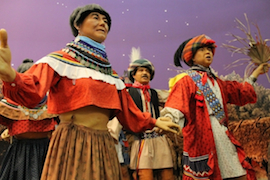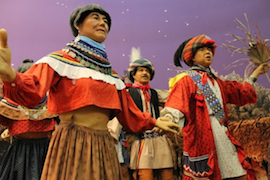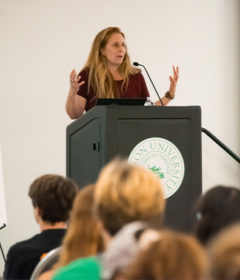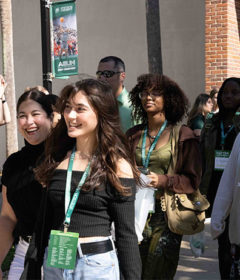Reiter Wins NEH Enduring Questions Grant

Kimberly Reiter, Ph.D., associate professor of history, has been awarded a National Endowment for the Humanities (NEH) Enduring Questions grant. Reiter was surprised and excited about the possibilities of what winning this grant could provide for her and her students.
“I quite frankly did not expect to be selected,” Reiter said. “However, I had heard about it while attending a special meeting sponsored by the Council for Undergraduate Research to connect academic institutions with granting agencies, and I realized I had a potential project that would be very exciting to create.”

Discovering how sustainability and fundamentalism impact diverse views of the natural state will be one of the main priorities in the junior seminar that Reiter has been developing since learning she won the grant. The course will be broken down into four different themes: cosmos, planet, humanity and the 21 century. Reiter is going to explore these topics with her students through various readings, discussions, student-led debates, a film series on the natural state and experiential learning.
A trip to the Ah-Tah-Thi-Ki Seminole Museum in the Florida Everglades, which is considered to be the last portion of “original Florida,” and a trip to the Orlando Science Center Crosby Observatory for a demonstration of origins cosmology research are also planned. By the end of the course, students will have to address one theme outside of their major and develop a supra-disciplinary and balanced perspective on the issue in a final paper.
Reiter is designing this course so that students can grapple with difficult questions. Some examples of the kinds of questions that will be addressed are:
- How can we ask people to defend their position on human rights if we disagree on how to define humanity?
- Can we return to a natural state, or are we now so inextricably creatures of technology that such a return would doom millions?
- Are people naturally competitors or sharers?
- How do we reconcile the biocentric and anthropocentric visions of the natural state?
- Has humanity changed the natural state too much for any return?
Reiter has high expectations of what this course can offer to her students.
“My goal in teaching this course is to rattle a student’s foundational beliefs a bit,” said Reiter. “We have a difficult time understanding not only our relationship to our planet but to ourselves as well. In short, the course will leave the student with more questions than answers, but will also provide them with tools to understand why the questions are so important to begin with.”
by Nicole Melchionda



